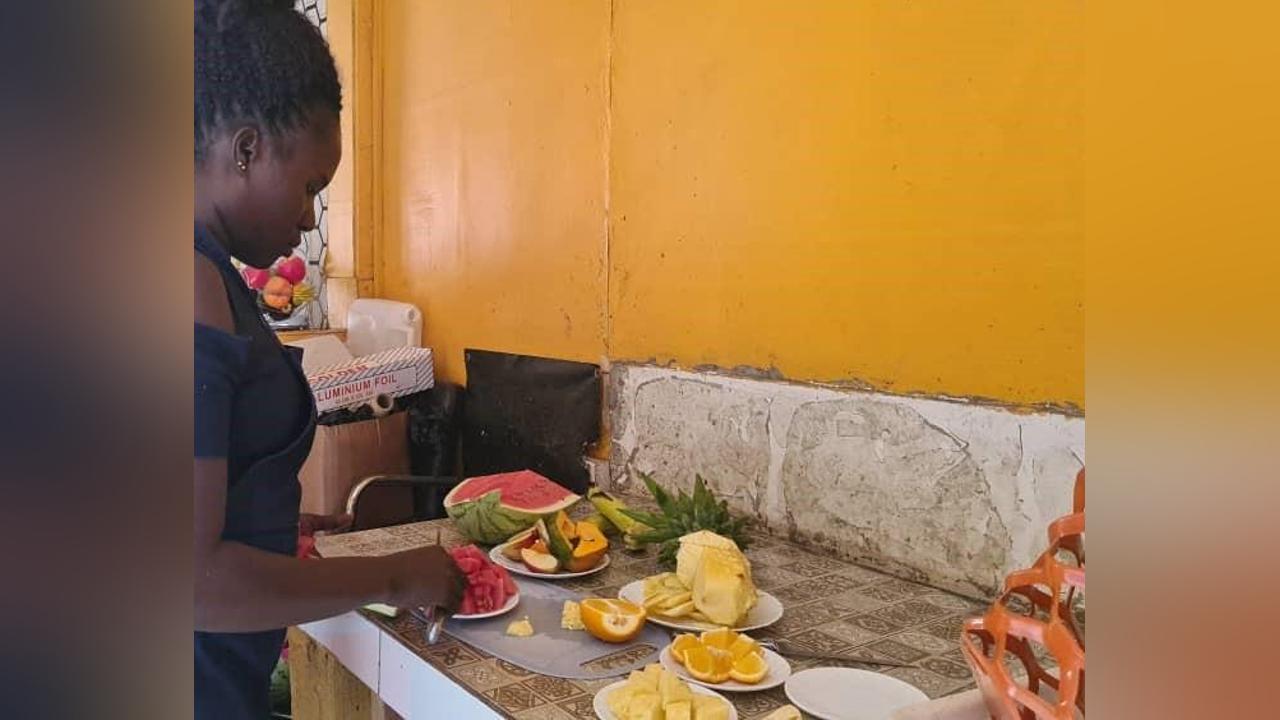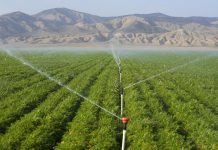Africa-Press – South-Sudan. Maka Scovia’s determination and hard work have positioned her as a successful entrepreneur, and with financial support from the UN development agency, she is now the architect of a thriving fruit and juice enterprise in Juba.
Ms. Scovia, 27, is the Chief Executive Officer of Amaka Fruits and Juice Enterprise, a women-led enterprise in Juba supported by the UN Development Agency – UNDP.
“I started within mango star here and I was under my sister at her restaurant where I started, then I said I have to move and start my own,” she told Eye Radio during an interview.
Scovia sells well-packed fruit salad at 4,000 SSP, a cup of fresh avocado and mango juice for 4,000, and a smaller cup at 3,000.
Despite the economic challenges facing the country, Scovia said determination has been key to her success.
“ I was committed, I was serious and determined. So, they (UNDP) gave me some little money, which I had to pay also back though it was not enough, but because of the trust they have for me they gave me the money; I worked and I paid their money on time.”
“It is a determination if you determine that you want to achieve something no matter challenges or difficulties, you still you will make it your dream.” the entrepreneur stressed.
In 2016, Scovia, who hails from Yei River County, graduated with a Diploma in Social Work and Social Administration from the Makerere Institute of Social Development in Uganda.
She also holds an advanced certificate in business administration from the same Makerere Institute of Social Development.
Though disrupted by the outbreak of the coronavirus pandemic in 2020, Scovia says this could not stop her from achieving her dream of establishing a successful business.
“I went to school and I looked forward to get a job but again, when I came here to Juba, I tried applying it was taking long then I was like, why can’t I be job creator then job seeker then I established my own work.” She said.
“That time, I started with 300 that is when I started, I bought chairs, I bought fridge, I bought all that I have though, they were little but because when you are starting a business, definitely start small and then you go big,” Scovia added.
The mother of one is among some South Sudanese young people who received an interest-free loan of 4,000,000 pounds from UNDP to boost their businesses.
The financial support is part of the Youth Enterprise Development and Capacity Building project funded by the African Development Bank in collaboration with the national Ministry of Youth and Sports.
The project targets youth between the ages of 18 and 35 by strengthening the private sector, building entrepreneurship skills, and improving the enabling environment for young entrepreneurs.
It also seeks to ensure that youth with the potential to grow as entrepreneurs are self-employed and create employment for others through their sustainable businesses.
This is done by addressing weaknesses in entrepreneurship skills, lack of access to finance, markets, and information, as well as enhancing employment and job creation for young people.
Scovia said though she is experiencing inadequate capital, the financial support from UNDP has enabled her to expand her business.
“One of them is inadequate capital, my capital is very small at the extent I cannot stoke many fruits, that is why sometimes I don’t get enough.”
“I have some of the full sum of fruits, I don’t get but ever since this project came in it real hoped me to expand my place.”
“The place was not like this before but right now my place is looking good I have expanded and I am also looking forward to open other branches.”
The Amaka Fruits and Juice Enterprise, situated at Customs Market in Juba, has the capacity to accommodate approximately 20 customers.
Though her commitment to work, Scovia has opened doors to many opportunities, and she believes hard work is critical in achieving one’s dream.
“I was determined or I am still determined that I have a goal to achieve or I have a vision ahead of me that is why you are seeing me 24/7 on, that is what is making me succeed in my business.”
“All like putting yourself together knowing that we have a future ahead of us that we need to work hard so that we get something to sustain our lives and our family, the community at large, there is a say that hard work pays.”
The Amaka Fruits and Juice Enterprise, established in 2020, has created jobs for about six other young women, the majority of whom are from disadvantaged families.
Arich Faisal Rahama, a senior three dropout, is a sales associate at the enterprise and her role is to serve customers with juice and fruit salads.
“Getting this work was not all that easy. I was just told by a friend that there is a work somewhere but I should just come and try my luck so I came and I did it.” Rahama, 24, said during an interview.
“Actually, the payment is okay, I have also gained a lot of skills, which include first of cutting fruits blending juice and many.”
While in senior three, Rahama said she conceived and dropped out of school, where she stayed at home for about three years.
She later got an opportunity to enroll at Orphanage Straight Link in Juba to complete her secondary education.
Being a single mother, Rahama was given the opportunity to pay half of the school fee of 75,000 pounds per year.
In 2020, she sat for the South Sudan Certificate of Secondary Education and scored 89.7% in the arts section, which enabled her to apply for the upcoming intake at the University of Juba.
The businesswoman appeals to young mothers to stay determined and follow their dreams, adding that no condition is permanent.
“There is no condition that is permanent, you should just believe in yourself and know that you will make it. If others can make it and graduate like an example of an old woman who graduated at the University of Juba, if she can do that who are you not to make it in your life?”
“Trust yourself and know that you will make it and indeed you will make it just like what I did I trusted what I did and I finally I did it.”
“I was at home for 3 years I didn’t know that I am going to finish my senior four but finally by God’s grace I did it and I am now joining University of Juba.”
According to UNDP, more than 90 percent of South Sudanese youth lack formal employment opportunities, with many relying on subsistence livelihoods to provide for their families.
The youth, who constitute 72% of the population, face barriers such as lack of access to financial capital, education, and market-driven skills, the UN agency said.
It adds that high illiteracy rates, particularly among women and youth, further hinder their ability to access business opportunities and markets, leading to a mismatch in skills and job availability.
According to the International Labour Organization and the World Bank, youth unemployment rates in South Sudan are among the highest globally.
For More News And Analysis About South-Sudan Follow Africa-Press






